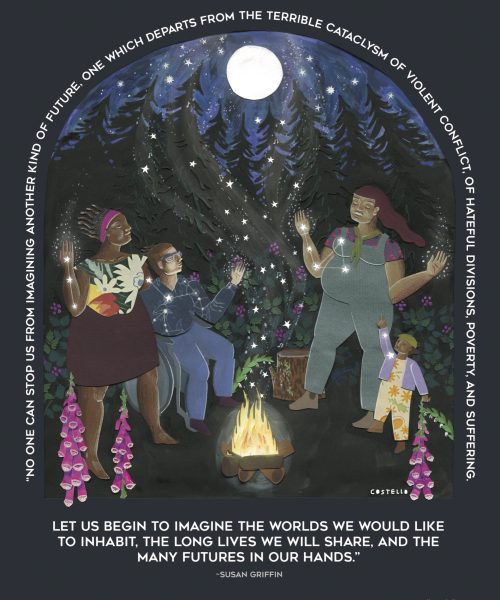Shared Resources & Shared Vision
The dominant culture tells us that there is not enough to go around. We are pitted against each other and compete for scraps while the main course is kept out of our reach. If we want a Solidarity Economy, we must reject the myth of scarcity and embrace the possibility of abundance. By practicing the values we wish to see reflected in our culture and society, including sharing resources and planning collectively within our movements, there will be more than enough to go around. Even as we make agreements with more powerful entities like governments and foundations, we support each other to maintain our sovereignty and stay true to our values.
PRINCIPLE: We create abundance by cooperating to access resources across all levels - internationally, nationally, regionally, and locally.
Practices
- PRACTICE: We can and should present ourselves to funders and investors in a unified way as a movement. Educate those who wish to provide resources to SE work about our shared values and principles. We must be explicit about what we mean by SE and the movement we are trying to build.
- PRACTICE: Conduct joint funder briefings and funder education initiatives, shared resource mapping, and clearly articulated theories of change that we share with each other and our potential supporters.
- PRACTICE: We can and should organize funder collaboratives (where foundations jointly pool resources for solidarity economies) with attention to the breadth of solidarity economies, taking care to avoid promoting any one model, tool, or project over another, and framing the work in terms of the economic, social, and racial equity we seek to address within our movements.
- PRACTICE: National organizations can fundraise with the explicit purpose to distribute funds to the grassroots membership using an equity lens. We can do this through shared grantmaking/participatory budgeting approaches using a process that gives members decision making power. (For example, the coalition NY Renews raises funds that are then distributed to their steering committee and hold a regranting process for the rest of the membership. This provides resources for everyone to participate in the coalition’s internal and external work in their own location and with their own communities.)
- PRACTICE: Regularly host movement strategy sessions with the groups in your area or sphere. Part of this should include a gap analysis to identify what we need to build movement and economic power in collaboration with groups on the ground.
- PRACTICE: Engage in participatory budgeting whenever possible inside our own individual organizations and more widely within our movements. The space in between our organizations and silos must be bridged. Our organizations and networks could all be contributing to common pools of money to put towards shared initiatives.
PRINCIPLE: We share information with each other. Financial and data transparency are essential to our democratic practices and to learning as a movement.
Practices
- PRACTICE: Funding sources and their uses should be transparent to the membership of any SE organization. For example, networks and federations can share their budgets with members at their member meetings along with information about where they money is drawn from, any restrictions placed on it, and expectations for its future flow.
- PRACTICE: Data about our movements should be shared (with consent) in ways that promote learning while anonymizing specific data points when that’s important. For example, SE groups that conduct surveys can share information with each other, and allied researchers, via the Data Commons Cooperative. Groups can choose what information to restrict and where special permission is required.
- PRACTICE: When we are seeking publicity for our projects, we will strive to tell the messy truth whenever possible, and when the story gets ahead of the reality, we commit to slowing down and catching up. For example, the founders of Renaissance Community Cooperative in Greensboro, NC held a webinar to discuss what happened after the coop closed, offering their hard-won wisdom to the SE community.
- PRACTICE: All SE entities and their associations, including their subsidiaries, should conduct regular social/democracy audits (e.g. every 1-5 years). This should be conducted by a member-elected committee aligning intentions and values with impact by using metrics for environmental impact, social impact, and community well-being. In Latin America this type of committee is called Consejo de Vigilancia. See Cooperatives for Sustainable Communities for a variety of social audit tools. The UN published a guide on social auditing, and the SA 8000 is a very formal international tool.
PRINCIPLE: We invest in Solidarity Economy and cooperative entities directly.
Practices
- PRACTICE: Prioritize direct financial gifts to models and practitioners on the ground without strings attached whenever possible.
- PRACTICE: When direct gifts are not possible, prioritize forgivable, zero-interest, or low interest loans whenever possible.
- PRACTICE: Prioritize direct investment in the models and practitioners on the ground whenever possible instead of channeling funds through third party organizations such as loan funds. When investing in a loan fund, make sure it is member controlled, like Seed Commons or the Buen Vivir Fund.
- PRACTICE: Prioritize building trade networks amongst SE/Coop entities. Look for ways to meet your individual and group needs by cooperating with other SE or Coop entities, whether that’s looking for a new vendor for your group or creating something new. For example, some groups form purchasing coops with other groups so they can access goods at a lower cost.
- PRACTICE: For individuals or groups with wealth or class privilege, consider making a significant redistribution of your wealth through direct gifts, as well as taking on higher financial risk to ensure that SE projects can offer higher returns (if applicable) to poor, working and middle class folks.
